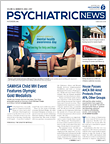While in-person cognitive-behavioral therapy (CBT) with or without medication remains the preferred initial treatment for obsessive-compulsive disorder (OCD), studies suggest that some 25 to 35 percent of OCD patients continue to experience symptoms of the disorder after treatment.
There is growing evidence to suggest computer-based CBT, novel pharmacological agents, and neuromodulatory techniques also might benefit these patients, according to a review article published April 4 in the Journal of the American Medical Association.
For the report, Matthew Hirschtritt, M.D., M.P.H., a PGY-3 at the University of California, San Francisco School of Medicine, and colleagues searched PubMed, EMBASE, and PsycINFO for studies published between January 1, 2011, and September 30, 2016, that addressed screening, diagnosis, and treatment approaches for OCD in adults 18 and older. Of the 792 articles identified, 27 were analyzed for the review.
The authors noted that while the latest data indicate that CBT continues to be the most effective psychotherapy for OCD—and most effective therapy overall when performed by experienced practitioners—there are significant barriers to CBT treatment. Such barriers include a lack of available therapists, high out-of-pocket costs, and intense time demands on the patient.
Remote treatment for OCD may offer one way to begin to chip away at these barriers. “Evidence from a meta-analysis suggests that remote CBT (via an online platform) demonstrates efficacy similar to that of in-person treatment,” Hirschtritt and colleagues wrote.
“The reassurance and knowledge patients gain [using remote CBT via online platform] can be therapeutic and quite effective,” Hirschtritt said in an interview with Psychiatric News. He emphasized that online therapy is best used as a supplementary treatment between in-person visits with health care practitioners and to provide structure. “For clinicians across psychiatry, this is another tool in their tool box,” he said.
Selective serotonin reuptake inhibitors (SSRI) remain the recommended first-line pharmacologic intervention for OCD. For patients who do not respond to SSRIs, the adjunctive use of typical or atypical antipsychotics may offer some relief, the authors noted.
Preliminary evidence suggests augmentation with ketamine, riluzole, N-acetylcysteine, memantine, lamotrigine, celecoxib, ondansetron, and some nutraceuticals may also reduce OCD symptoms in treatment-resistant patients, but the authors noted that more work is needed to support the routine use of these agents in treating OCD.
For the most severe treatment-resistant OCD cases, there is some evidence to suggest neurosurgery and deep-brain stimulation may decrease symptoms of the disorder, the authors wrote.
“Despite the severe impairment and burden of OCD, it often goes unrecognized and undertreated or untreated,” Hirschtritt and colleagues noted. “Conditions that can commonly be confused with OCD, such as generalized anxiety disorder, should be considered and ruled out. Important moderators of treatment efficacy (presence of comorbid tics or hoarding symptoms, level of insight) should also be assessed because these may help guide choice of initial treatment.”
The study was funded by the Tourette Syndrome Association of America, the Brain and Behavior Research Foundation, the Patterson Foundation, and the State of Connecticut Department of Mental Health and Addiction Services. ■
An abstract of “Obsessive-Compulsive Disorder: Advances in Diagnosis and Treatment” can be accessed
here.
